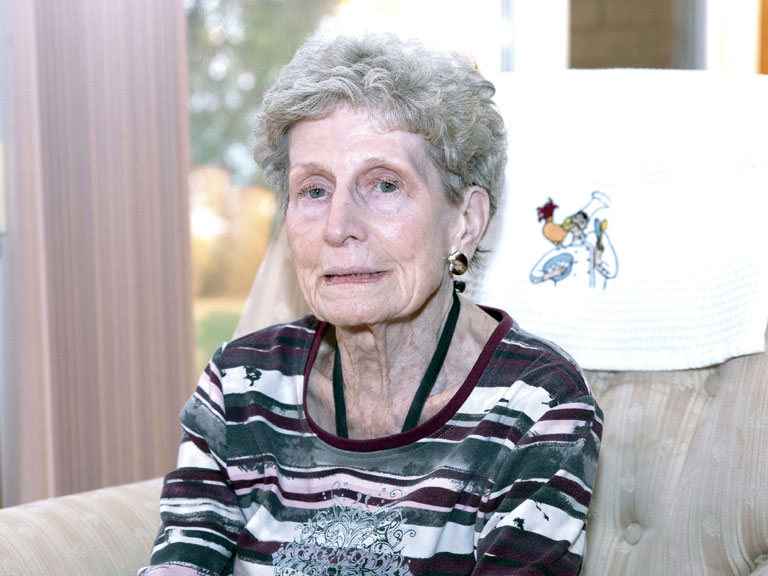County News
Answering the call

Juliet Clark enlisted at age 17
During her first year of medical training at university in 1943, Juliet Clark found out that she was going to be conscripted after she reached the age of seventeen and a half. Preferring instead to take fate into her own hands, she decided to enlist in the Royal Navy, with the aim of joining the aerial photography group. “I went to my dad and said, ‘I know you’re not going to be happy with this, but I’m going to volunteer.’ So I went down to the naval office and put my name in. By doing that, I could chose the service that I wanted, and I wanted to do aerial photography,” says Juliet. She was sent from her home in London to await training at Westcliff- on-Sea, which by coincidence was where she was born, and where very good friends of her parents operated a hotel. As a result, she always had an open invitation for dinner and was encouraged to bring a friend or two with her. She was at Westcliff-on-sea for a few months before being sent to Bournemouth for training as a photography assistant, and then she was assigned to a naval base in Crail, Scotland. The base was used for training torpedo bomber crews, and an on-board camera would be operating during their practice runs to check the accuracy of their aim. “We would take the film from the plane and develop it and it would show whether or not it had hit the target,” says Juliet.
Sometimes she ended up in the air herself. “Lots of times I was lying on my belly in an old Anson, flying alongside the pilot doing a line overlap, which means the camera keeps clicking while following them. We developed the film and printed them and pasted them on the wall where the guys could see them and it would tell them whether or not dropping their bombs and torpedoes were accurate.” She was released from service in October, 1945 and her service record noted that she was “[a] very pleasant girl with good manners. Very good character during service.” A couple of years ago, she was awarded the Women’s Royal Navy Service Medal, and was given a Veterans lapel badge. She has worn them only once, and appears to have misplaced them after attending a formal occasion at the Legion.
She met her husband-to-be, Ross (a Canadian), while on leave back in her London home near Windsor Castle. “We dated a bit, then he came home to meet my parents,” says Juliet. “We went out to dances and things, because the guys were always having parties.” They were married in September 1945, and Ross returned home that November. Juliet did not come to Canada until March of the following year. “The girls that were married longer had priority, some of them had babies. We had a baby in our cabin—there were five of us to a cabin—and this poor woman had this baby who got so sick, and she got sick. So I got the job of looking after this baby, taking him back and forth to the doctor on the ship.” Juliet disembarked in Halifax and was placed on a train for Montreal. “I felt a little bit like a piece of cattle. They stood me up on a platform and they called out, ‘This is Juliet Clark. Is there anyone here to claim her?’ It made me feel kind of funny, but Ross was there to get me and we went back to his home in Highwater, Quebec.” Ross worked for Interprovincial Pipelines, and they spent eight years in Regina before moving back to Clarkson. With a young family to take care of, Juliet didn’t get the opportunity to pursue a career in medicine, but she was able to follow her passion of horse riding, continuing to do so until her late seventies. Ross retired from work and they moved to Wellington 35 years ago. Ross died in March, 2019 and Juliet has been on her own since, and continues to live in the house that she loves so much.
Juliet has strong memories of the war years. “We went through such a rough time, and you remember it whether you want to or not. I was in a small restaurant with three other girls and the bombs dropped basically beside us. We all went under the table and fortunately none of us were hurt. But you never knew. Where I lived we could stand on the balcony and watch the battle of London. One time they came and they dropped a bomb, missed this house, dropped a bomb, missed this house, dropped a bomb, missed our house, dropped a bomb and they never hit one single house in that solid row, which was lucky. But you never know.” She saw families who lived in dreadful conditions in the Underground “It’s a tough thing with all the friends that you lose, or their parents didn’t survive, or the houses that got blown up. Many a night after a bombing, and we’d get up in the morning and houses are splattered all over the place and you know people are not alive, and I think it hits you a little bit harder at that age, and you realize the whole world is going through this, and it’s kind of the thing you think about and take with you wherever you go. I think it’s just a good way of reminding yourself of all these other people who didn’t survive, or some that did and were wounded. I see no excuse for not taking a few minutes and thinking about these things.”

Comments (0)